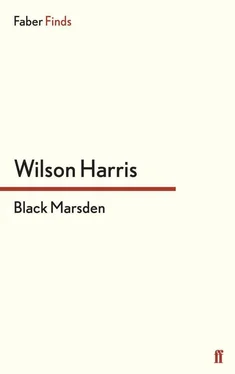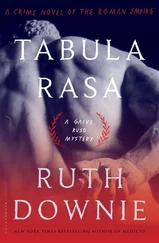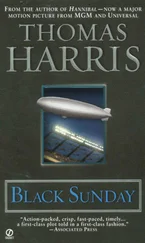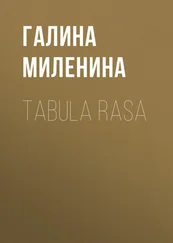And now those pounds of flesh, legs, body were marching into the room. “The hideousness of all charm, the hideousness of all compulsion,” Goodrich spoke aloud before he could stop himself. Jennifer eyed him with her unbandaged eye.
“Hideous!” she said. “What an unkind thing to say, Clive. Have you never seen a mud pack, a beauty pack? I have done my right half …” she pressed her right cheek …“and now I’m on to my left.” She pressed her left cheek.
A mud pack, thought Goodrich. He was shaken. Why not stone pack or wood pack?
Whom or what did one see or acquit in the sculptured or dismembered presences of history? To what extent was one capable of real choice, real judgement, real perception, the making up of one’s own buried harassed mind about the secret of personality?
Jennifer’s explanation was common-or-garden enough but it highlighted rather than depressed the sensational workshop of the gods — a sense of gross alchemy which had been fired as he turned and saw the picture framed in the door at the end of a long-forgotten room or corridor or drama of relationships, from the day he emerged head foremost from another body into the light of the sun. He was so immersed now, so steeped in that reflection, that Marsden’s lips moved now but he heard nothing. He may have been Jennifer’s doctor or husband or father or midwife or all combined, upbraiding her or consoling her but the words were stilled within the objects in the mirror of time. Traumatic target. Goodrich began to leave the room. He paused at the door for an instant as if to confirm that gross stillness, sack of coals, mud head, stone head, wood head, gross pounds of flesh: as if to confirm the necessity to choose (or to be free to choose) someone or something of his own secret will.
Then as he moved finally and withdrew from the room with a sense of powerful dejection, he recalled the fissure or crack or breach he had sensed before in the bandaged head of stillness. There was, after all, this fissure or crack within the womb of implacable illusion that enveloped him, stunned him. There was this dawning thread of complex consciousness woven into every intensity of fabric — complex shores and biases of memory. Easter Island enigma of birth — every lighthouse of soul — on the shores of Scotland and around the globe.
He set out on one of his favourite walks from Trinity to Cramond; descended through Starbank Park into Starbank Road; the sea stretched before him. Occasional rags lay at the water’s edge beneath the sea wall like disembowelled toys over and beyond which the wings of sea-gulls flashed in the sun, settling in the water and on a ruffled day like this, with a gentle wind and hardly a cloud in the sky, seeming to roll or sail tenderly upon the purest green and blue reflected marbles.
He set out along Starbank Road upon the pavement that ran close to the wall. There were houses close to the footpath on the other side of the street and on a wild blowing day when the tide was full the spray would fly toward them from the sea.
He came to Granton Road and was steeped once again in the senses of the neighbourhood, antennae toward past times: past moorings and harbours and custom houses: the spectral feeling which both modern and ancient Edinburgh aroused in him as no other city did. Was it a reticent self-deceiving, self-revealing film of time blowing still, not yet settled into oblivion? The lines ran in his head:
They do not always deal in blood
Nor yet in breaking human bones,
For Quixot-like they knock down stones.
Regardless they the mattock ply
To root out Scots antiquity.
He struck away from the water’s edge now along West Granton Road, past a Ministry of Labour Training Centre and the Granton Gas Works, and towards the playing fields which bordered Silverknowes Road.
Every time he came this way he delighted afresh in the open sky which sometimes appeared to him to knit itself into everything — into grey brick and green tree and into an everchanging mirror of space and water (where the city ran to meet the sea) as the days lengthened towards the summer solstice and the nights shortened into unpredictable spray of stars, veiled or unveiled galaxies.
Was it, Goodrich wondered, because of that texture of sky that Edinburgh was regarded as a masculine city? Was it that open sky which accentuated the vertically of every spire or monument raised by man or nature?
He made his way now along Silverknowes Road back to the water’s edge and dawdled along the foreshore to Cramond. The blue, green waves curled into animated frescoes of memory that seemed to reach towards Harp’s horizons and lakes across the Atlantic: to reach also farther south into the South Americas — South American savannahs pasted upon the globe like an abstract realm within fiery longitudes.
He recalled the sky-line of Edinburgh which he had seen for the first time, he believed, from the vicinity of the disused quarry of Craigleith. It had been a clear day like this and upon the slate of time one could see spires, the hunched back of Arthur’s Seat and the Castle.
He recalled also a view of the Lawnmarket from the roof of St. Giles Cathedral and the rock ridge with its pattern of the Old Town accentuated against the sea of the sky.
All these vistas seemed to curl and uncurl now into ebbing and flowing waves or tides. The sea of the sky reached everywhere, spires and rocks seemed equally fraught with energies that shot upwards but witnessed to an inherent spatial design, geology of psyche.
He was so immersed in the depth of the present and the recollections of the past that he stumbled into a tiny rivulet running to the sea. A soaked page of newspaper lay on the ground with glaring headlines on sewage pollution beyond Cramond. Beyond Cramond , thought Goodrich. Not far from here. It seemed incredible. Near and yet far in an abstract haze of sun, rain and cloud mingling far away all of a sudden. A blissful paradox sealed his senses at that moment, an inner peace almost despite ominous headlines; he was lost again in contemplating distances. In contemplating the engineering marvel of the Firth of Forth Bridge which arched into the sky and across frescoes of water.
*
Goodrich arrived at last at Cramond and ascended the steps from the foreshore into the ordered village with its exquisite houses laid out like a child’s beautiful overgrown toys in which it seemed a marvel that flesh-and-blood lived. He passed the ancient church on the site of a Roman settlement before coming to a bus stop.
Then the scene changed as the bus bore him out of the village passing a row of rather uniform-looking cottages on the right hand, open grounds on the left, into a great sweeping stretch of countryside dotted with occasional formal gardens and individual houses followed by a golf course and open lands running up to Lauriston Castle. Now he was back in Edinburgh proper, driving through rows of neat houses and shops; along Queensferry Road, through Blackhall to Dean Bridge where he alighted from the bus.
Staring after the back of the bus which quickly vanished over the bridge Goodrich thought of the driver’s licence he possessed which had lapsed many years ago; later — though he had come into a lot of money — he was still apathetic about owning a car. He was a great walker; sometimes he would walk many miles, hop upon a bus, get off and walk again, savour every patch of wall or field or sky. Immerse himself in every historical scarecrow like a rich tramp. When he felt more luxuriously inclined he would hire a car and a chauffeur for the day, make for himself a swifter patchwork cloak, patchwork miles.
He raised himself up now and peered over the Dean Bridge at the steep and narrow valley of the Water of Leith. Many a poor devil had taken his life here — leapt from this bridge; leapt from Sky into Creek, sudden pouring light into inexplicable darkness; suspended pawn in the workshop of the gods. The thought fascinated him — the thought of a woven texture or chessboard of visibles and invisibles: the thought that here , somewhere out there in space beneath him were squares of light and darkness in which something moved, disappeared, pawn or knight moved, bishop or king disappeared. Something moved, reappeared, flashed again, darkened….
Читать дальше












![Антон Архангельский - Tabula Rasa - Исходная точка [калибрятина]](/books/392380/anton-arhangelskij-tabula-rasa-ishodnaya-tochka-k-thumb.webp)